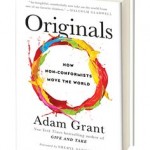 This past fall semester I started a book club for marketers on our campus, and our first book was Originals: How Non-Conformists Move the World by Wharton professor Adam Grant.
This past fall semester I started a book club for marketers on our campus, and our first book was Originals: How Non-Conformists Move the World by Wharton professor Adam Grant.
Originals is full of unique insights, such as the creative merits of strategic procrastination (when a task remains undone it stays active in our minds and allows room for divergent thinking).
In addition, Grant offers thought-provoking advice on building cultures of originality:
- Hire not on cultural fit, but on cultural contribution.
- Shift from exit interviews to entry interviews.
- Ask for problems, not solutions.
- Stop assigning devil’s advocates and start unearthing them.
- Welcome criticism.
Originals is a not a marketing book but has plenty of applications for marketing and communications professionals. Here are three of my takeaways:
1. Triple the number of ideas you generate.
It’s a simple numbers game. If we want to increase the likelihood of having an influential or successful idea, we need to produce more ideas and move beyond the most conventional ones. “It’s only after we’ve ruled out the obvious that we have the greatest freedom to consider more remote possibilities. Once you start getting desperate, you start thinking outside the box.”
2. Speak up about your original idea, then rinse and repeat.
Think of a familiar tune and tap its rhythm on your desk. Would a friend be able to recognize the song? When conducting this activity, the author has found that people are overconfident in their predictions. Why? We can’t tap the tune without hearing it in our head. This exercise illustrates the challenge of presenting an original idea. “You’re not only hearing the tune in your head. You wrote the song.” We can’t imagine what it sounds like to others who are hearing it for the first time. Because our new suggestion is so familiar to us, we tend to under-communicate it without realizing how much exposure our audience needs to understand and accept it.
3. Focus on character versus behavior.
Grant explains how character praise leaves a more lasting impact. Who knew that a parenting lesson would extend to marketing? When the focus is on character, “we internalize it as part of our identities.” Grant explains that people evaluate choices differently when we shift emphasis from behavior (“don’t cheat”) to character (“don’t be a cheater”). How might this guidance apply to our various calls-to-action in higher ed (for instance, “be a giver” versus “give now”)?
Our spring semester book is The Inevitable: Understanding the 12 Technological Forces That Will Shape our Future by Kevin Kelly, co-founder of Wired.
What is on your 2017 reading list?




